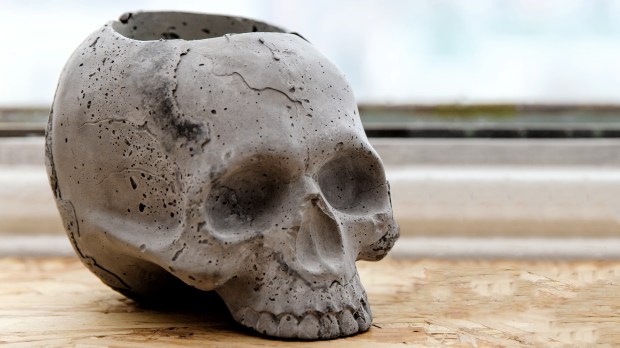Anyone who has lost a loved one can tell you that our modern culture has a very weird relationship with death. Most people are squeamish about the topic of dying, which is strange for something that everyone is absolutely guaranteed to do, sooner or later. Ironically, we’d all be better off if we thought about death a little more.
At least, that’s the premise of memento mori, a long-standing Christian tradition that recognizes the powerful spiritual value in remembering one’s death in order to live well. “Memento mori” literally means “Remember that you will die.” Practicing memento mori means taking some time each day to meditate on this truth.
Probably it sounds odd to call this ancient custom a “trend,” but it really is having a cultural resurgence lately, thanks in large part to Sr. Theresa Aletheia Noble, FSP. Noble is a religious sister with the Daughters of Saint Paul, the “media nuns.” Her work to promote the practice of memento mori has been featured in The New York Times, Forbes, WPR and other places.
It turns out that meditating on the fact that we will die helps us to appreciate our lives more deeply while we have them. Catholics are called to live counter-cultural lives in many ways, and one of those ways is to resist the “culture of death avoidance” that surrounds us. As Sister Theresa Aletheia Noble writes,
Remembering one’s death is an absolutely essential aspect of the Christian life not only because it helps us to live well but also because it helps us to remember what Christ has done for us. Jesus trampled death! Reflecting on death is not a morbid affair, it is a healthy and often healing practice that helps us accept the inevitable with hope.
The Church, in her wisdom, has set apart the month of November to remember those who have died. During November, it’s traditional to visit cemeteries and pray for the holy souls in purgatory. Besides praying for the dead, another way to enter into the liturgical spirit of this month is to remember our own deaths as well. That makes it a very fitting time to embrace the practice of memento mori ourselves.
This practice need not be something elaborate. In one interview, Sister Noble said,
I really think that sometimes people think of this practice as something that’s very complex, but it’s really not. It’s actually just the conscious bringing to mind the reality of your death every single day for what could be a few moments to a time of prayer.
If you’d like to practice memento mori yourself, here are a few things that might help.
1Use visual reminders
Sister Theresa Aletheia Noble started her practice of memento mori by keeping a ceramic skull on her desk. Nowadays, her collection has grown a lot bigger:
People send her skull mugs and skull rosaries in the mail, and share photos of their skull tattoos. A ceramic skull from a Halloween store sits on her desk. Her Twitter name includes a skull and crossbones emoji.
If you’re starting this practice, a memento mori rosary might be really helpful. And it doesn’t hurt that it looks pretty cool and tough, too.
2Follow a guide
Practicing memento mori has been life-changing for Sister Theresa Aletheia Noble, so now she’s channeling her experience into helping other people practice it too. She’s created a memento mori desk calendar, devotional, writing journal, and even apparel (all of which can be found here).
Want to grow spiritually this Advent? Check out her new Advent Companion, which “will help you to explore the reality that Advent means nothing without recognizing that Jesus came to save us from death, humanity’s most intimidating enemy and impossible adversary.”
3Keep it simple
The spirit of memento mori is perfectly summarized in this section of the Rule of St. Benedict:
Fear the Day of Judgment: be in dread of hell. Ardently desire everlasting life with deep spiritual longing. Keep death daily before your eyes. (4: 44-47).
Ultimately, it’s not complicated. Recalling that our time here is limited and can end at any moment is a powerful motivator to make the best use possible of the time that we do have.
What does it mean to “keep death daily before your eyes”? The answer will look different for every one of us. But we do know that taking up this practice, in whatever form, can help us live with a greater sense of purpose and gratitude.
This November, the month of the dead, let’s set aside time to practice memento mori. It’s a profound way to live this liturgical season and to find the eternal meaning in our ordinary, beautiful, utterly unique lives.



